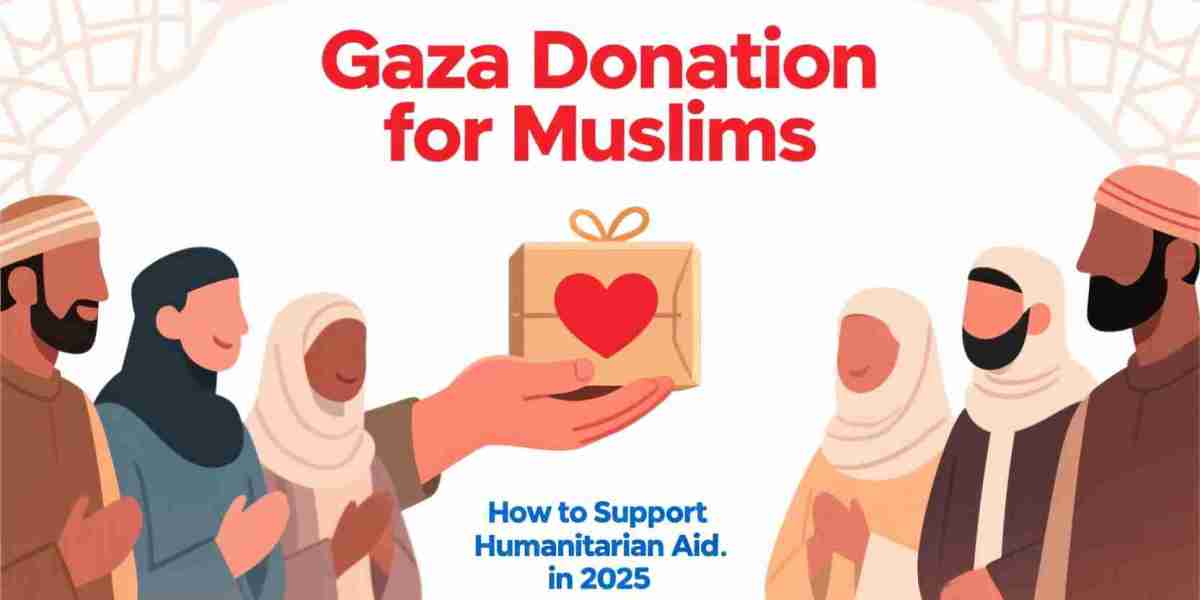The ongoing crisis in Gaza has left millions of Muslims and other residents in dire need of humanitarian aid. For Muslims worldwide, contributing to Gaza’s relief efforts is not only an act of charity but also a fulfillment of religious and moral obligations. The concept of giving, rooted deeply in Islamic teachings, emphasizes the importance of helping those in distress, especially in regions like Gaza, where conflict and economic hardship have created immense suffering.
This article explores the significance of Gaza donations for Muslims, the challenges faced by the people of Gaza, the Islamic perspective on charity, and practical ways to contribute to this noble cause. By understanding the crisis and the role of donations, Muslims can make a meaningful impact while adhering to the principles of compassion and solidarity.
The Humanitarian Crisis in Gaza
Gaza, a small strip of land on the eastern coast of the Mediterranean, has been grappling with a prolonged humanitarian crisis for decades. Home to over two million people, the region faces severe challenges due to ongoing conflict, blockades, and economic instability.
Families in Gaza struggle to access basic necessities like food, clean water, medical care, and shelter. The healthcare system is overwhelmed, with hospitals lacking essential supplies and infrastructure.
Many residents live in overcrowded conditions, and unemployment rates are among the highest in the world. For Muslims, the suffering of their brothers and sisters in Gaza resonates deeply, as the region holds historical and spiritual significance, being part of the broader Palestinian struggle.
The crisis has been exacerbated by recurring violence, which has destroyed homes, schools, and businesses. Children, who make up nearly half of Gaza’s population, are particularly vulnerable, facing malnutrition, trauma, and limited access to education. The blockade imposed on Gaza restricts the flow of goods and aid, making it difficult for international organizations to deliver sufficient support.
This dire situation calls for urgent action from the global Muslim community, as well as others who wish to alleviate the suffering. Donating to Gaza is not just about providing material aid but also about restoring hope and dignity to a population enduring unimaginable hardship.
The Islamic Perspective on Charity
In Islam, charity, or sadaqah, is a cornerstone of faith, reflecting compassion, generosity, and a commitment to social justice. The Quran and Hadith emphasize the importance of giving to those in need, particularly during times of crisis. The Prophet Muhammad (peace be upon him) taught that charity does not diminish wealth but instead brings blessings and spiritual rewards.
For Muslims, donating to Gaza aligns with the principle of zakat, the obligatory almsgiving that purifies wealth and supports the less fortunate. Beyond zakat, voluntary charity (sadaqah jariyah) offers ongoing rewards, especially when it supports projects like rebuilding schools or providing medical care in Gaza.
The concept of ummah, the global Muslim community, underscores the duty to support Muslims facing hardship, regardless of geographical boundaries. Gaza, as a predominantly Muslim region, represents a call to action for Muslims to embody the values of empathy and solidarity. The Quran states, “The believers are but brothers” (49:10), highlighting the responsibility to stand with those in distress.
By contributing to Gaza’s relief efforts, Muslims fulfill a religious obligation while addressing a pressing humanitarian need. Charity in this context becomes an act of worship, fostering unity and compassion within the global Muslim community.
Why Gaza Donations Matter for Muslims
Donating to Gaza holds profound significance for Muslims, as it combines spiritual duty with tangible impact. The people of Gaza face unique challenges that require sustained support. Food insecurity affects a large portion of the population, with many families relying on aid to survive.
Medical facilities, strained by years of conflict, struggle to treat patients with chronic illnesses or injuries. Education has also been severely disrupted, with schools damaged or repurposed as shelters. By donating, Muslims can help address these critical needs, ensuring that aid reaches those who need it most.
Moreover, Gaza donations resonate with the Islamic principle of standing against injustice. The blockade and recurring conflicts have created an environment where basic human rights are often denied. Contributing to Gaza’s relief efforts is a way to advocate for justice and dignity for the Palestinian people.
For Muslims, this act of giving is not only about providing immediate relief but also about supporting long-term recovery and resilience. Donations can fund projects like clean water initiatives, vocational training, and infrastructure rebuilding, which empower communities to rebuild their lives.
How Muslims Can Contribute to Gaza’s Relief Efforts
Muslims around the world can play a vital role in supporting Gaza through donations and advocacy. One of the most effective ways to contribute is by donating to reputable humanitarian organizations that operate in Gaza. Organizations like Islamic Relief, UNRWA, and other trusted charities have established networks to deliver aid efficiently.
These groups provide food parcels, medical supplies, and educational resources, ensuring that donations make a direct impact. When choosing an organization, Muslims should verify its credibility and transparency to ensure funds are used effectively.
Another way to contribute is by supporting long-term development projects. For example, donations can fund the construction of wells to provide clean water or the rebuilding of schools to restore education. Muslims can also engage in fundraising efforts within their communities, organizing events or campaigns to raise awareness and funds.
Online platforms have made it easier than ever to donate, with many organizations offering secure portals for contributions. Additionally, Muslims can advocate for Gaza by sharing information about the crisis and encouraging others to get involved. This collective effort amplifies the impact of individual contributions.
Challenges in Delivering Aid to Gaza
Delivering aid to Gaza is fraught with challenges due to the region’s complex political and logistical environment. The blockade restricts the entry of goods, including humanitarian supplies, which delays or limits the delivery of aid. Security concerns also complicate the work of relief organizations, as ongoing conflicts can disrupt operations.
Despite these obstacles, many organizations have developed strategies to navigate the restrictions, such as coordinating with local authorities and using established supply routes. For donors, understanding these challenges highlights the importance of supporting organizations with experience in Gaza, as they are better equipped to overcome logistical hurdles.
Another challenge is ensuring that aid reaches the most vulnerable populations. Corruption and mismanagement can sometimes hinder the distribution of resources. To address this, Muslims should prioritize donating to organizations with a proven track record of accountability. Transparency reports and third-party audits can provide assurance that funds are being used as intended. By staying informed and selective, donors can ensure their contributions make a meaningful difference in the lives of Gaza’s residents.
The Impact of Donations on Gaza’s Future
Donations to Gaza have the power to transform lives and communities. In the short term, contributions provide immediate relief, such as food, medical care, and shelter for displaced families. These efforts save lives and alleviate suffering in a region where basic needs are often unmet. In the long term, donations support sustainable development, helping Gaza move toward recovery and self-sufficiency. Projects like vocational training programs empower individuals to earn a living, while infrastructure investments create opportunities for future generations.
For Muslims, the act of donating to Gaza is a way to embody the values of compassion and justice taught by Islam. It is an opportunity to make a tangible difference while earning spiritual rewards. By coming together as a global community, Muslims can help alleviate the suffering in Gaza and contribute to a brighter future for its people. Every donation, no matter how small, plays a role in this collective effort to support those in need.
FAQs
Why is donating to Gaza important for Muslims?
Donating to Gaza is important for Muslims because it fulfills the Islamic principles of charity (zakat and sadaqah) and supports the global Muslim community (ummah). It addresses the humanitarian crisis in Gaza, where residents face food insecurity, medical shortages, and limited access to education.
How can I ensure my donation reaches Gaza?
To ensure your donation reaches Gaza, contribute to reputable organizations like Islamic Relief or UNRWA. Verify their transparency and track record through reports and audits to confirm funds are used effectively.
What types of aid are most needed in Gaza?
Gaza needs food, medical supplies, clean water, shelter, and educational resources. Long-term projects like rebuilding schools and providing vocational training are also critical for sustainable recovery.
Can small donations make a difference in Gaza?
Yes, even small donations can make a significant impact when combined with others’ contributions. They can fund essentials like food parcels or medical care, helping alleviate suffering in Gaza.
How does the blockade affect aid delivery to Gaza?
The blockade restricts the flow of goods, including humanitarian aid, into Gaza, causing delays and shortages. Reputable organizations work with local authorities to navigate these challenges and deliver aid effectively.





